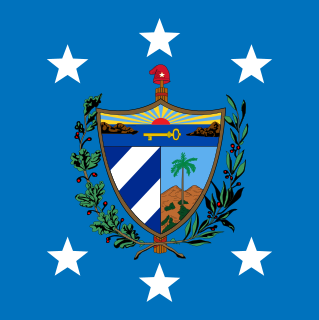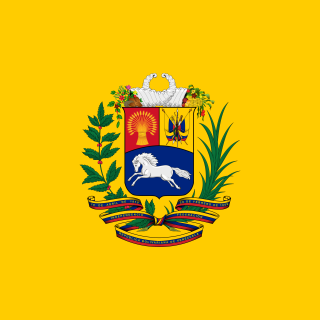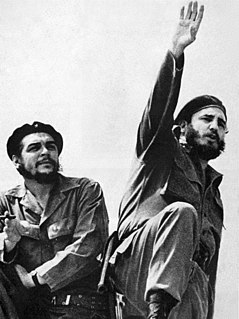The island of Cuba was inhabited by various Mesoamerican cultures prior to the arrival of the Spanish in 1492. After the arrival, Spain conquered Cuba and appointed Spanish governors to rule in Havana. In 1762, Havana was briefly occupied by Great Britain, before being returned to Spain in exchange for Florida. A series of rebellions during the 19th century failed to end the Spanish rule. However, the Spanish–American War resulted in a Spanish withdrawal from the island in 1898, and following three-and-a-half years of subsequent US military rule, Cuba gained formal independence in 1902.

Fulgencio Batista y Zaldívar was the elected President of Cuba from 1940 to 1944, and the U.S.-backed authoritarian ruler from 1952 to 1959, before being overthrown during the Cuban Revolution. Batista initially rose to power as part of the 1933 Revolt of the Sergeants, which overthrew the provisional government of Carlos Manuel de Céspedes y Quesada. He then appointed himself chief of the armed forces, with the rank of colonel, and effectively controlled the five-member "pentarchy" that functioned as the collective head of state. He maintained this control through a string of puppet presidents until 1940, when he was himself elected President of Cuba on a populist platform. He then instated the 1940 Constitution of Cuba and served until 1944. After finishing his term he lived in Florida, returning to Cuba to run for president in 1952. Facing certain electoral defeat, he led a military coup against President Carlos Prío Socarrás that preempted the election.

The Twenty-fourth Amendment of the United States Constitution prohibits both Congress and the states from conditioning the right to vote in federal elections on payment of a poll tax or other types of tax. The amendment was proposed by Congress to the states on August 27, 1962, and was ratified by the states on January 23, 1964.
A one-party state, single-party state, one-party system, or single-party system is a type of state in which one political party has the right to form the government, usually based on the existing constitution. All other parties are either outlawed or allowed to take only a limited and controlled participation in elections. Sometimes the term de facto one-party state is used to describe a dominant-party system that, unlike the one-party state, allows democratic multiparty elections, but the existing practices or balance of political power effectively prevent the opposition from winning the elections.

The President of the Republic of Cuba, officially called President of the Council of State between 1976 and 2019, is the head of the Council of State of Cuba. The office in its current form was established under the Constitution of 2019. The president is the second most powerful position, after the First Secretary of the Communist Party of Cuba.

Elections in Cuba involve nomination of municipal candidates by voters in nomination assemblies, nomination of provincial and national candidates by candidacy commissions, voting by secret ballot, and recall elections. Cuba is a one-party state with the Communist Party of Cuba as the "leading force of society and of the state" under the national constitution, although elections are nominally non-partisan.

The National Assembly of People's Power is the legislative parliament of the Republic of Cuba and the supreme body of State power. Its members are elected from multi-member electoral districts for a term of five years. The Assembly's current President is Esteban Lazo Hernández. The assembly meets twice a year. Between sessions it is represented by the 31 members Council of State. The most recent elections were held on 11 March 2018.

The President of Venezuela, officially known as the President of the Bolivarian Republic of Venezuela is the head of state and head of government in Venezuela. The president leads the National Executive of the Venezuelan government and is the commander-in-chief of the National Bolivarian Armed Forces. Presidential terms were set at six years with the adoption of the 1999 Constitution of Venezuela, and presidential term limits were removed in 2009.

The Prime Minister of Cuba, known as the President of the Council of Ministers between 1976 and 2019, is the head of the Council of Ministers of Cuba.
The Cuban Revolutionary Party – Authentic, commonly named Authentic Party, was a political party in Cuba most active between 1933 and 1952. Although the Partido Auténtico had significant influence, it eventually became unpopular and, despite significant reforms, Fulgencio Batista returned to power.

The 1940 Constitution of Cuba was implemented during the presidency of Federico Laredo Brú and took effect on 10 October 1940. It was primarily influenced by the collectivist ideas that inspired the Cuban Revolution of 1933. Widely considered one of the most progressive constitutions at the time, it provided for land reform, public education, a minimum wage and other social programs. It had 286 articles in 19 sections.

Since its independence from Portugal in 1975, Angola has had three constitutions. The first came into force in 1975 as an "interim" measure; the second was approved in a 1992 referendum, and the third one was instituted in 2010.

The 1901 Constitution of Cuba took effect in Cuba on 20 May 1902, and governments operated under it until it was replaced by the 1940 Constitution of Cuba. It was adopted by delegates to a Constitutional Convention in February 1901, but the United States, then exercising military authority over Cuba following the end of Cuba's war for independence from Spain, withheld its approval until the Convention amended the Constitution in June to incorporate language from a U.S. statute, the Platt Amendment, that placed limitations on Cuban sovereignty and provided a legal basis for future U.S. military interventions in Cuba.

The Falkland Islands general election of 1976 was held in 1976 to elect members to the Legislative Council. Four out of the ten Councillors were elected through universal suffrage, two from Stanley and one each from East Falkland and West Falkland. The election was delayed twice, first in November 1975 when the dissolution of the Legislative Council was postponed by ten weeks to 31 January 1976 and then again in January 1976 when it was postponed to 28 February 1976. This was done in the hope that the election would be held under the proposed new constitution and to allow the Falkland Islanders opportunity to study the report of the Select Committee before the election took place. In reality, the new constitution did not come into force until the following year, with the first election under the new constitution taking place in October 1977, just 15 months after the last election.

Parliamentary elections are scheduled to be held in Cuba in 2023 to elect members of the National Assembly of People's Power. They will be the first elections since 1976 that neither Fidel or Raúl Castro are involved.

A constitutional referendum was held in Cuba on 24 February 2019. Voters were asked whether they approved of a new constitution passed by the National Assembly of People's Power in July 2018. The reforms were approved, with 91% of valid votes cast in favour.











